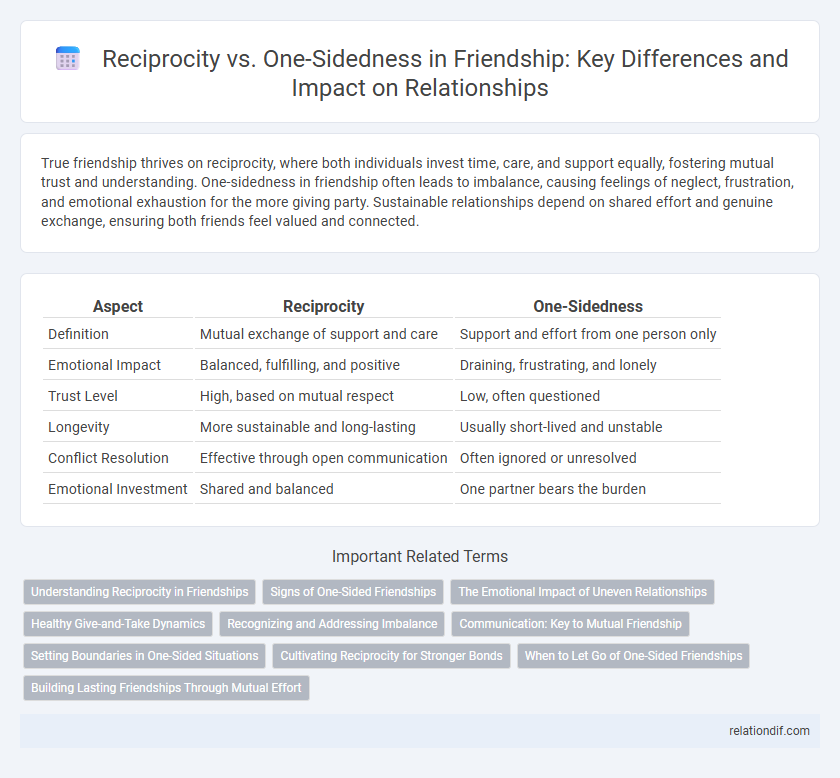True friendship thrives on reciprocity, where both individuals invest time, care, and support equally, fostering mutual trust and understanding. One-sidedness in friendship often leads to imbalance, causing feelings of neglect, frustration, and emotional exhaustion for the more giving party. Sustainable relationships depend on shared effort and genuine exchange, ensuring both friends feel valued and connected.
Table of Comparison
| Aspect | Reciprocity | One-Sidedness |
|---|---|---|
| Definition | Mutual exchange of support and care | Support and effort from one person only |
| Emotional Impact | Balanced, fulfilling, and positive | Draining, frustrating, and lonely |
| Trust Level | High, based on mutual respect | Low, often questioned |
| Longevity | More sustainable and long-lasting | Usually short-lived and unstable |
| Conflict Resolution | Effective through open communication | Often ignored or unresolved |
| Emotional Investment | Shared and balanced | One partner bears the burden |
Understanding Reciprocity in Friendships
Understanding reciprocity in friendships is essential for maintaining balanced and supportive relationships, where both parties contribute emotionally, practically, and socially. One-sided friendships often lead to feelings of neglect and imbalance, as one individual consistently invests more time and effort without equivalent return. Recognizing mutual give-and-take fosters trust, respect, and long-term connection, making reciprocity a cornerstone of healthy social bonds.
Signs of One-Sided Friendships
One-sided friendships often exhibit signs such as consistent lack of effort from one party, where messages and plans are rarely initiated in return. A key indicator is emotional imbalance, with one friend frequently offering support without receiving similar care or understanding. Persistent feelings of neglect, frustration, and being undervalued highlight the absence of genuine reciprocity in these relationships.
The Emotional Impact of Uneven Relationships
Uneven friendships characterized by one-sided emotional investment often lead to feelings of neglect, resentment, and diminished self-worth for the overgiving party. Reciprocity in relationships fosters mutual trust, validation, and emotional security, essential for sustaining long-term bonds. Emotional imbalance undermines connection quality, increasing the risk of burnout and social withdrawal.
Healthy Give-and-Take Dynamics
Healthy friendships thrive on balanced reciprocity where both individuals actively contribute emotional support, trust, and shared experiences. One-sided relationships often breed resentment and dissatisfaction due to uneven effort and unmet expectations. Mutual give-and-take dynamics promote deeper connection, respect, and long-term stability in friendships.
Recognizing and Addressing Imbalance
Recognizing imbalance in friendship requires awareness of reciprocity, where mutual support and effort sustain strong bonds. One-sidedness often leads to emotional fatigue and weakened trust, signaling the need for open communication and boundary-setting. Addressing these issues fosters healthier connections and promotes long-term friendship stability.
Communication: Key to Mutual Friendship
Effective communication fosters reciprocity in friendship by ensuring both parties express feelings, needs, and expectations clearly. When communication is one-sided, misunderstandings and resentment arise, weakening the bond. Mutual dialogue builds trust and balance, essential for a lasting and meaningful friendship.
Setting Boundaries in One-Sided Situations
Setting boundaries in one-sided friendships is essential to maintain emotional well-being and avoid burnout. Clearly communicating limits helps prevent feelings of resentment and encourages mutual respect, promoting a more balanced and healthy connection. Recognizing when efforts are consistently unreciprocated allows individuals to prioritize relationships that truly value their time and energy.
Cultivating Reciprocity for Stronger Bonds
Cultivating reciprocity in friendships fosters mutual trust and deepens emotional connections, creating a balanced exchange of support and understanding. Consistent efforts from both parties to give and receive strengthen the bond, preventing feelings of resentment or neglect. Prioritizing reciprocal interactions encourages long-lasting and meaningful relationships built on shared values and mutual respect.
When to Let Go of One-Sided Friendships
Recognizing the signs of a one-sided friendship involves noticing consistent imbalances where effort, communication, and emotional support are predominantly provided by one person. When attempts to address these disparities result in little to no change, or when the friendship begins to cause emotional exhaustion and resentment, it may be time to reevaluate the relationship's value. Prioritizing mutual respect and genuine connection helps ensure friendships contribute positively to wellbeing rather than draining emotional energy.
Building Lasting Friendships Through Mutual Effort
Building lasting friendships requires mutual effort where both parties invest time, trust, and support equally, fostering a balanced exchange that strengthens bonds. Reciprocity in friendship enhances emotional connection and resilience, while one-sidedness often leads to resentment and eventual distance. Prioritizing open communication and shared experiences ensures friendships remain fulfilling and sustainable over time.
reciprocity vs one-sidedness Infographic

 relationdif.com
relationdif.com